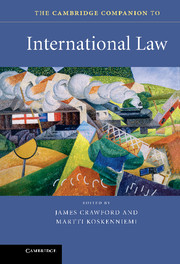Book contents
- Frontmatter
- Contents
- Preface
- Notes on contributors
- Introduction
- Part I The contexts of international law
- Part II International law and the state
- Part III Techniques and arenas
- Part IV Projects of international law
- Guide to electronic sources of international law
- International law chronology
- Select guide to further reading
- Index
- References
Introduction
Published online by Cambridge University Press: 05 July 2015
- Frontmatter
- Contents
- Preface
- Notes on contributors
- Introduction
- Part I The contexts of international law
- Part II International law and the state
- Part III Techniques and arenas
- Part IV Projects of international law
- Guide to electronic sources of international law
- International law chronology
- Select guide to further reading
- Index
- References
Summary
Purpose of the Companion
From an exotic specialisation on the fringes of the law school, international law has turned during the twentieth century into a ubiquitous presence in global policy-making as well as in academic and journalistic commentary. With internationalisation first, globalisation later, questions about the legality under international treaties or customary law of this or that action were posed with increasing urgency in the media and by citizen activists as well as by governments and international institutions. International law exited the chambers of diplomacy to become part of the debates on how the world is governed. With good reason, the last ten years of the old millennium were labelled by the United Nations General Assembly the ‘Decade of International Law’. The decade saw such impressive developments as the establishment in 1995 of the World Trade Organisation (WTO) with a powerful system for settling trade disputes. In 1998 the Rome Treaty was adopted that led to the setting up of the International Criminal Court (ICC) to try suspected war criminals and those committing grave violations of human rights. The system of multilateral human rights and environmental treaties expanded and, as many said, henceforth needed more deepening rather than widening. The UN Security Council arose from its Cold War slumber to take action in many regional crises, sometimes with more, sometimes with less success, but always surrounded by much legal argument. Cooperation in development and in the organisation of international investment took a legal turn: the rhetoric of ‘rule of law’ penetrated everywhere. The same trends continued in the first decade of the new millennium. At the same time, however, new concerns emerged. Violations of human rights and humanitarian law kept occurring, especially in the Third World but also in Europe, while only little progress was attained in the eradication of poverty and global economic injustice. Some activities led by the Great Powers such as the bombing of Belgrade by the North Atlantic alliance (NATO) in 1999 or the campaign to oust Saddam Hussein from Iraq’s leadership in 2003 became the subject of heated debate. The relationship between the fight against terrorism and the protection of human rights divided opinions in Europe and elsewhere. While the number of democratic countries increased, democracy also brought popular restlessness and conflict out in the open.
- Type
- Chapter
- Information
- The Cambridge Companion to International Law , pp. 1 - 22Publisher: Cambridge University PressPrint publication year: 2012
References
- 3
- Cited by

